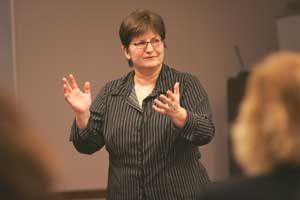
Photo by Bruce Gilbert
Technology alone is not the savior of education, according to Kathleen P. King, Ed.D., professor of adult education at Fordham University. But podcasts, wikis and blogs can transform classrooms into truly collaborative learning centers.
That was the message she gave to teachers and other education professionals on April 7 at an inter-university symposium on adult learning. King told representatives from New York University, Teacher’s College-Columbia University and Fordham how “Foundations of American Education,” a class she is teaching to 30 students, has embraced new media.
“It’s so exciting to see this come alive with these students, as they create their essays not just as papers that they hand in to me, but as critical essays they then post to a password-protected blackboard for the whole class to read,” she said.
“They say they’ve never done that before in this particular situation,” she continued. “We’re finally getting that learning community with them, whereas in the classroom we’re always playing beat the clock.”
What’s really taken off for King is podcasting. Since she began recording and editing her classes, King has made available for free 160 hours of lectures on professional development and publishedPodcasting for Teachers: Using a New Technology to Revolutionize Teaching and Learning(Information Age, 2007). She said more than 3.6 million people worldwide have downloaded and listened to the podcasts, from as far away as Turkey, Russia and Malaysia. As a result, adult students are taking her lessons with them to gyms, on trains and wherever else is convenient.
“They’re fitting learning into their lives,” she said. “They’re the lifelong learners; they have more options and we’re decreasing the barriers.”
Of course, technology didn’t come easily to her when she first began her academic career. In fact, her mentor was a technophobe, so instead King focused on transformative learning. Figuring out that she could combine it with technology was like two people colliding into each other to create a Reese’s Peanut Butter Cup, she said.
“
Transformative learning bridged right into my ed tech world,” she said. As a result, much of her research has been on how technology really throws people off kilter.
“They might be resistant to it; they might be scared of it; it might be forced on them; it might be mandated; it might be changing too quickly. Whatever it is, it’s putting a huge pressure and getting everything anxious and throwing things out of whack on them,” she said. “Transformative learning helps us to understand what adults do with that, and how for some people, it turns into an experience, and different stages of working through to a total change in perspective.”
